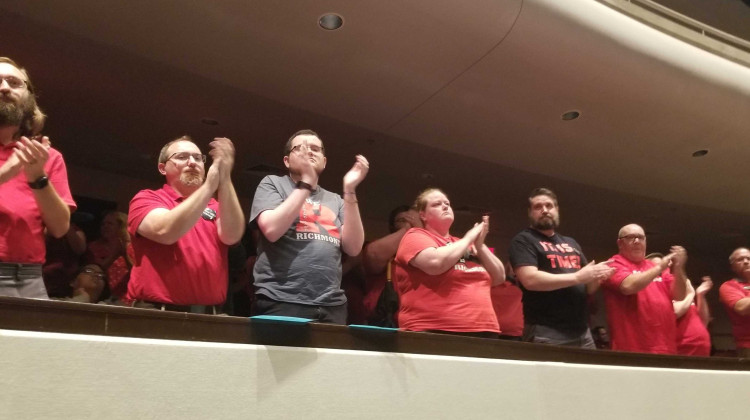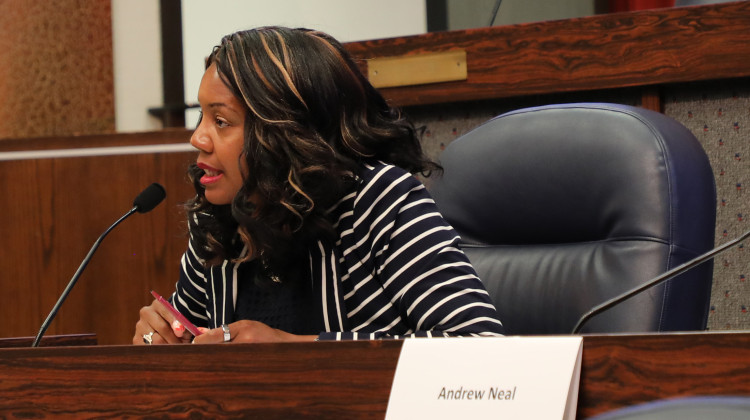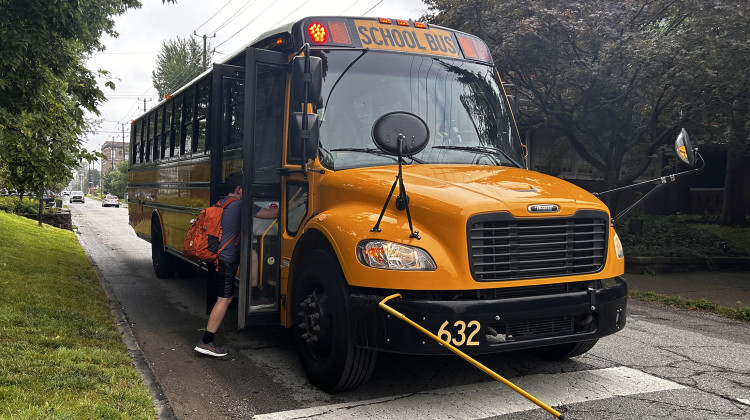
Richmond Education Association supporters attended a Sept. 27 school board meeting to voice concerns about the district's supplemental payments and decision to suspend REA President and teacher Kelly McDermott.
Kirsten Adair/IPB NewsA legal dispute between a teacher's union in Richmond and their school corporation may set an important precedent for how educator salaries are negotiated across the state.
The Richmond Community Schools board recently set up temporary “supplemental payments” to teachers for this school year. But the local teachers union argues the payments infringe on their bargaining rights.
Jay Lee, the current Richmond Education Association president, said the school and union were both interested in solving pay disparities this year for teachers who have not received raises despite years of experience. However, he said the school proposed its own plan and passed it without input from the REA.
“We told them, ‘You are spending money that should be collectively bargained,’ and that the union should have some say in what’s being spent at this time,” he said. “They did not agree with us, and they did not hear us, did not listen to us. They went ahead and approved that pay structure.”
District leaders said the payments are intended as an incentive to retain and attract teachers.
“The board approved supplemental payments for teachers in May to address disparities in salaries at different levels of teaching experience,” said Richmond Community Schools Board President Nicole Stultz in a video. “Although the REA has challenged the method of implementation, the payments have received positive feedback from many teachers. By addressing these inequities, the board demonstrated its respect as well as high regard for the dedicated RCS teachers.”
The payments are different for each teacher, based on their salary from the previous school year and their evaluations. They are paid out over the course of the 2023-24 school year but are not permanent salary increases.
Generally, state law allows districts to make such payments without union approval.
Yet, the Richmond Education Association (REA) alleges the district is violating state labor law because these payments came before legally-required base salary negotiations for this year began. The association has filed an Unfair Labor Practice charge with the Indiana Education Employment Relations Board (IEERB) over the dispute.
“They’re spending money allocated for this contract year, this budget cycle, and not on last year’s contract,” Lee said. “That’s the reason for the first ULP.”
Jennifer Smith-Margraf is vice president of the Indiana State Teachers Association, which is backing the REA’s charge.
“It reduces the amount of funding that's available for base wages,” said Smith-Margraf. “And so what it does is it undercuts the ability for everyone to be able to provide salary increases to those people who are in the bargaining unit and to value the people who are already on staff to keep them.”
Wages are one of the few items state law still requires schools to bargain or discuss with their teachers' chosen labor representatives.
Join the conversation and sign up for the Indiana Two-Way. Text "Indiana" to 73224. Your comments and questions in response to our weekly text help us find the answers you need on statewide issues.
If the IEERB rules the district did nothing wrong, it may open the door to more districts doing this and limit union power to negotiate lasting salary increases.
In an emailed statement, a Richmond Community Schools spokesperson said the district believes “the law is clear and that it permits the supplemental payments.” The spokesperson declined to provide further comment, citing “the advice of counsel” and pending Unfair Labor Practice charge.
The law says schools can make these supplemental payments “in excess of the salary specified” in the compensation plan that comes out of bargaining. When the Richmond school board approved the payments in May, it based them off of previous school year salaries.
Negotiations over salaries for the new school year are legally required to begin in September. ISTA's Smith-Margraf said she hasn’t heard of attempts by districts to make supplemental payments in advance of new contract negotiations like this in the past.
“I'm not sure why we're seeing it now,” Smith-Margraf said.
The IREEB decision on the Richmond case will likely come in the next few months. A similar case is also playing out in Evansville.
The REA filed a second Unfair Labor Practice complaint after the start of the current school year when the previous REA president, Kelly McDermott, was accused by the school of “willful insubordination” and placed on administrative leave. Richmond Superintendent Curtis Wright recommended that the school board cancel McDermott’s contract.
“If you look around the parts of the state, it's still a little early in the bargaining process, but so far all that I have heard from folks is that it's going well everywhere, that they have positive relationships with their administration and they're working through what any issues in terms of the funding that they have received,” Smith-Margraf said. “I'm not really sure why it is that the administration in these two particular areas have decided not to respect educator voices and to go outside the process in doing it.”
The state legislature has gradually stripped away power teachers unions have long had over the years. This year, for example, the legislature narrowly voted to remove requirements for school administrators to discuss certain working condition changes with their teachers’ labor representatives — including supplemental payments or stipends.
Proponents said the law would free schools from “regulatory handcuffs.” Teachers and their unions said it would “silence” them.
Tre Ronnie, a member of the REA, said association members were especially frustrated with the lack of communication from the corporation surrounding the new state law.
“We kept bringing that question back. Are you going to continue discussion? Are you going to continue discussion? And they kept hedging it and saying, ‘Well, we haven't even talked about it,’” Ronnie said. “I think a lot of the ire right now actually goes back to that, because of their failure to continue discussion speaks to us that our voices don't matter.”
In the face of such legislative changes, ISTA’s Smith-Margraf said it is important to protect the few tools state law still gives teachers unions — like required collective bargaining for base salaries.
“We have a huge educator shortage going on,” she said. “And so it's very important through that collective bargaining process that we are using our educator voices to talk about what we need to do to retain folks and attract them into the profession. If administrations are going outside that process, all that's doing is incentivizing people to leave those districts and to not stay because they don't feel like they are respected or valued.”
Adam is our labor and employment reporter. Contact him at arayes@wvpe.org or follow him on Twitter at @arayesIPB. Kirsten is our education reporter. Contact her at kadair@wfyi.org or follow her on Twitter at @kirsten_adair.
 DONATE
DONATE








 Support WFYI. We can't do it without you.
Support WFYI. We can't do it without you.